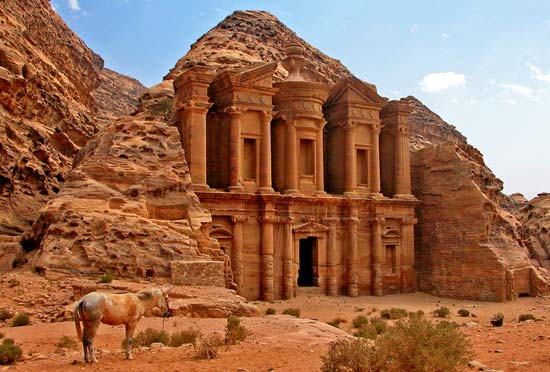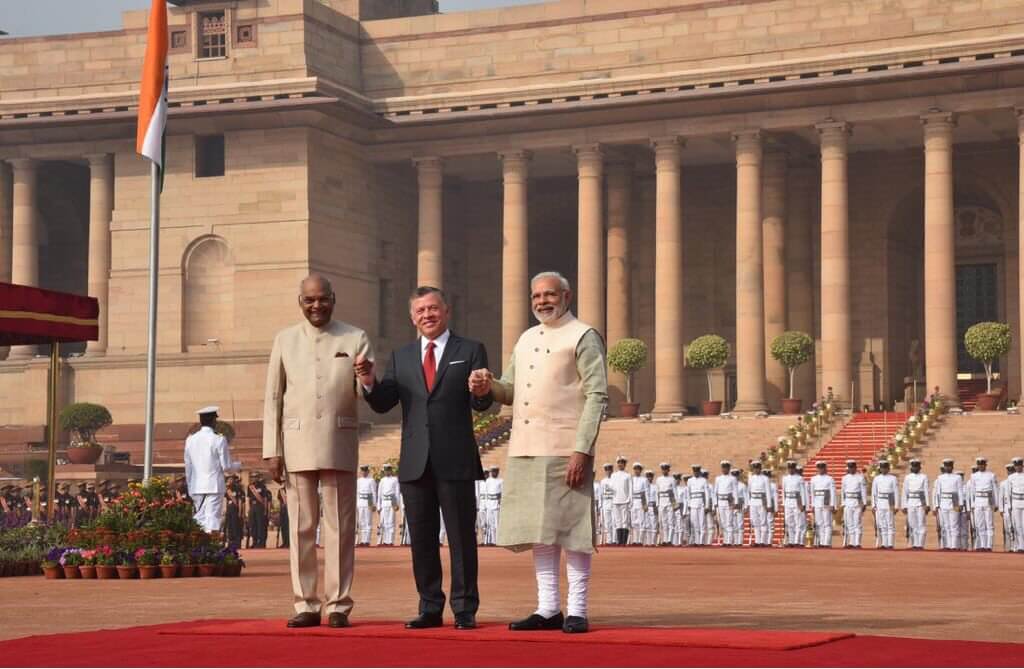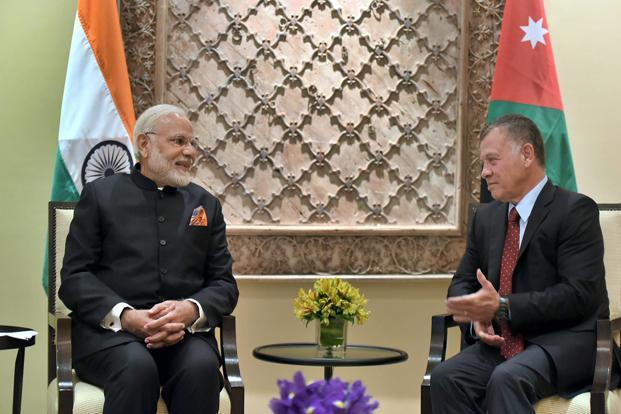Breaking
- MENU

During his visit in the last week of December 2017, Jordanian Foreign Minister Ayman Al Safadi flagged the possibility of India’s role in reducing tensions in the Middle East. Until now, such diplomatic noises for an active Indian role were only within the context of the Israeli-Palestinian conflict.The controversy surrounding US President Donald Trump’s decision to recognize Jerusalem as Israel’s capital has catapulted Jordan into the centre stage of international diplomacy over the status of the City.
Safadi’s presence in New Delhi should be seen against the backdrop of the events taking place in the Middle East. Amidst ongoing regional tensions, Trump’s decision has aggravated the on-goingIsraeli-Palestinian conflict. Thismove led to the UN General Assembly resolution adopted on December 21, 2017 which overwhelmingly condemned and rejected the US move. India voted in favour of the resolution thereby signalling its continued support to the Palestinian cause. With the Hashemites’ claim that they are the legal guardian of the holy places, coupled with the sizeable number of Palestinians in their country, the Jerusalem question is central to Jordan’s foreign as well as domestic politics.
The Foreign Minister’s visit at this crucial time definitely hints that Jordan seeks more than a low-level transactional relationship with India. During his lecture at Indian Council of World Affairs (ICWA), the Minister argued that India’sinvolvement is critical for fighting terrorism and other forms of political violence. On the bilateral front, he bluntly admitted that “relations are good but not near the potential.” Hence, he called on India to increase its role at two levels, namely, with the region and with the Hashemite Kingdom.
India’s increasing security cooperation in the region is important for Jordan as regional instability affects its economic stability and even long-termpolitical survival.Events in neighbouringIraq and Syria, Jordan’s major trading partners in perishable goods (Jordan exports vegetables and fruits to neighbouring countries), adversely affect its economic growth. These developments area threat to Jordan’s security as well. Syrianrefugees coming to Jordan are mostly young and if they are not provided with better social and economic amenities, they could be attracted towards extremism and violence out of desperation. The refugees can be converted into demographic dividends but that puts heavy financial pressure on resource-scarce Jordan. Hence, for political and economic reasons, security cooperation with India and other countries is critical for Jordan.
Safadi’smost interesting statement at ICWA was on the regional structure of cooperation which requires third party intervention. He did not hesitate to compare economic strength and political stability of Jordan and Israel and their unequal power distribution. The tension between the two neighbours has increased in recent months due a host of reasons, such as absence of Israeli-Palestinian dialogue and the Jerusalem controversy. He therefore called for an Indian role in bringing the parties to the table since it shares cordial relations with both. Jordan is appreciative of India’s recent vote in favour of the UNGA resolution on Jerusalem.
On the other hand, though Indo-Jordanian relations are characterized by “warmth and goodwill based on mutual respect”[1],due to their different world views, bilateral engagements were minimal during the Cold War period. While King Hussein visited India in 1963, the next monarchical visitof King Abdullah II along with Queen Rania, came only in 2006. From the Indian side, the first head of State visit to Jordan took place only in October 2015 when President Pranab Mukherjee undertook a three-state visit to Israel, Palestine and Jordan. External Affairs Minister (EAM) Sushma Swaraj paid a visit to Amman in January 2016 and in November that year, Minister of State for External Affairs, M. J. Akbar, visited the kingdom. As of now, no Indian Prime Minister has ever visited Amman. Prime Minister Narendra Modi’stravel schedule for 2018 does not indicate a visit to Jordan; though there are reports that he may be visiting Palestine.
The two countries have minimal bilateral trade standing at less than US$2 billion, one of the lowest in India’s trade with the Middle East. This is mainly because of a small commodity basket comprising mainly of fertilizers and manufactured goods. Unavailability of energy and lack of demand for expatriates meant that Jordan is not a lucrative partner for India. In order to have an enduring relationship, the two countries need to have a symbiotic arrangement and this needs engagement, which has been lacking until now. Further, since the conventional areas of cooperation do not offermuch scope, New Delhi and Amman should look for unconventional areas of cooperation.
In recent years, India has expanded its cooperation with other countries of the region such as United Arab Emirates, Saudi Arabia, Iran and Qatar on a host of security related issues like terrorism, cyber security, terror finance, protection of sea lanes of communication, intelligence sharing and coordination in fighting extremism. These areas are equally important for Jordan and offer a template for expanding cooperation with it. Though there were no public pronouncements, during his visit in March last year, Chief of Royal Court and a close confidant of the King, Fayez Tarawaneh met the then Defence Minister Manohar Parrikar and National Security Advisor Ajit Doval.
Moreover, for India, cooperation in security areas is crucial if it wants to play a bigger role in the region. In this venture, Jordan, an “oasis of peace” as pointed out by President Mukherjee in October 2015, is the best option available. The complementary remark has to be seen within the context of the kingdom’s stability when some of its neighbours were in the midst of internal turmoil.The country’s strategic location in the region makes it even more important. Increasing cooperation in conventional areas such as trade, Information and Communication Technology (ICT), agriculture etc. will help in strengthening the Jordanian economy while cooperation in areas like security will ensure the country’s economic as well as political stability and in return earn praise for India. Here, it is important to note that the Hashemites helped India in its expatriate evacuation process during the Kuwait crisis of 1990-91 and they have been in the forefront of international front against the extremist Islamic State.
During his two day visit, the Jordanian Foreign Minister met EAM Swaraj, Minister of Commerce Suresh Prabhu and Minister of State M.J. Akbar. The Jordan Times reported that during his meeting with Prabhu, the two countries showed keenness in boosting trade and investment cooperation and while meeting with Akbar, he stressed on regional developments and efforts to deal with Middle East crises, especially the Palestinian-Israeli Conflict.
Safadi revealed that King Abdullah would be visiting India this year. Tarawaneh’s engagements with the Indian security establishment in March 2017 andSafadi’s recent statements on India’s involvement in the region in terms of counter-terrorism and securityindicate that the major agenda for the two countries during the King’s visit could possibly relate to security cooperation and requesting India’s greater involvement in the Middle East peace process. In terms of economic and political incentives, the kingdom has very little to offer but unlike other countries; extremism is a fundamentalthreat to its existence. Partly for this reason, the kingdom has been in the forefront of fighting militant extremism and the Islamic State. Trade and commerce, though important, is likely to take a back seat. But is India ready to increase its security engagements with Jordan?
As part of its editorial policy, the MEI@ND standardizes spelling and date formats to make the text uniformly accessible and stylistically consistent. The views expressed here are those of the author and do not necessarily reflect the views/positions of the MEI@ND. Editor, MEI@ND: P R Kumaraswamy

Manjari Singh is an Associate Fellow at Centre for Land Warfare Studies (CLAWS) and has obtained her doctorate from Jawaharlal Nehru University, New Delhi for her thesis on Sustainable Development in Jordan: A Study of Social, Economic and Environmental Dimensions. She is a SYLFF Fellow and specializes in sustainable development and the Middle East. Her research papers have appeared in international journals such as Migration and Development, Contemporary Review of the Middle East and Mediterranean Quarterly. She has co-authored Persian Gulf 2018: India’s Relations with the Region (Singapore: Palgrave Macmillan) and has co-edited Islamic Movements in the Middle East: Ideologies, Practices and Political Participation (New Delhi: Knowledge World) and National Security Challenges: Young Scholars’ Perspective (New Delhi: CLAWS/Pentagon Press). She prepared India Watch (June 2012-July 2015) for MEI. She also served as Assistant Editor of Contemporary Review of the Middle East (Sage Publications) and Managing Editor of CLAWS Journal (KW Publishers). She is in-charge of CLAWS flagship event, Field Marshal Manekshaw Essay Competition, a pan-India University level competition.

During the three-day visit of King Abdullah II of Jordan to India at the end of February, both the s.....

Will King Abdullah’s visit be more than the Usual? King Abdullah of Jordan is arriving.....

During the three-day visit of King Abdullah II of Jordan to India at the end of February, both the sides discu.....

Will King Abdullah’s visit be more than the Usual? King Abdullah of Jordan is arriving in New De.....

In their eagerness to focus on and flag the de-hyphenation of the traditional Israel-Palestinian binary, most .....
